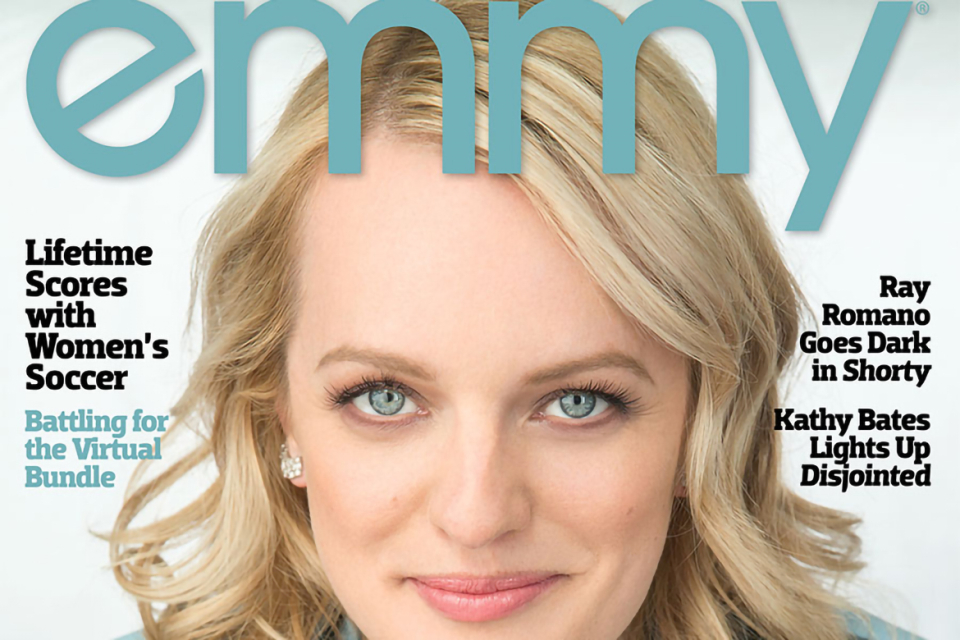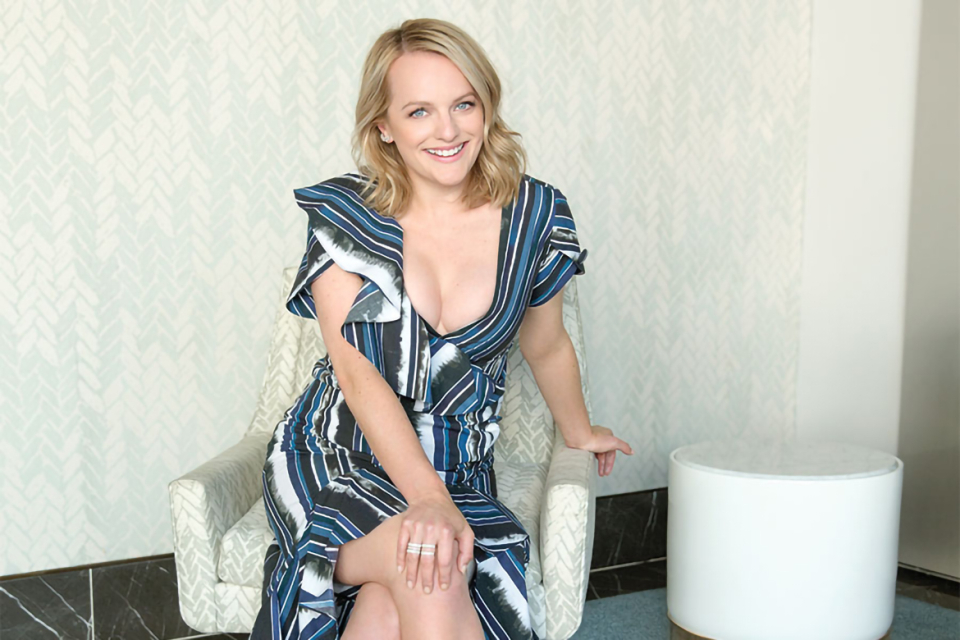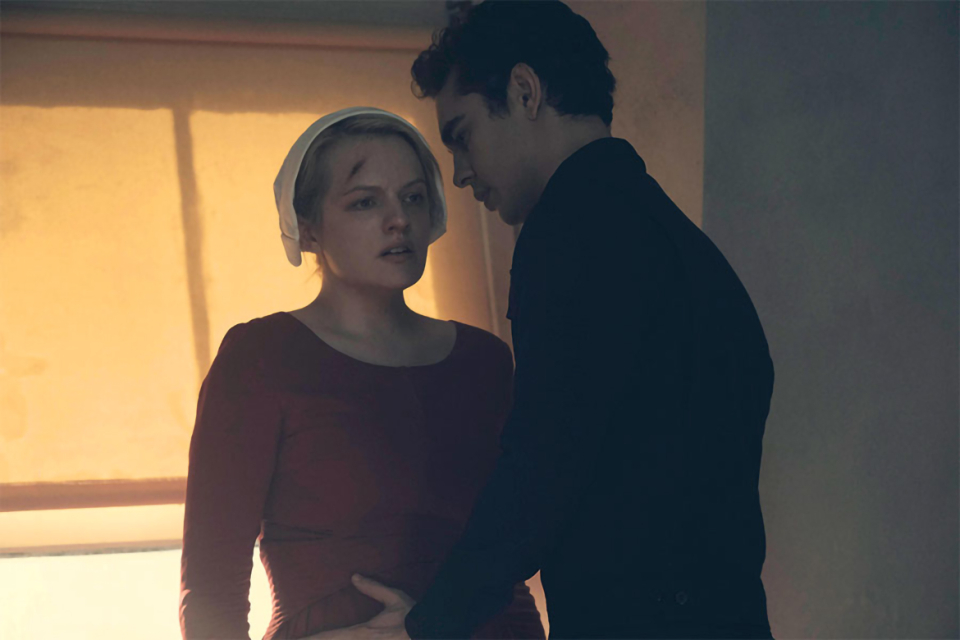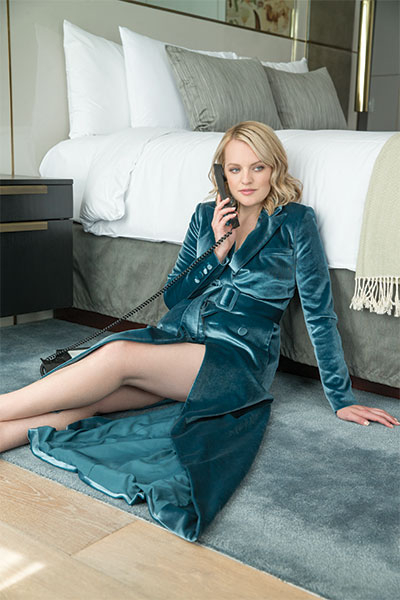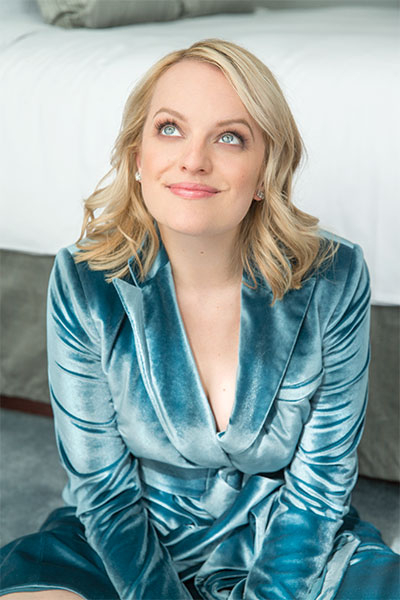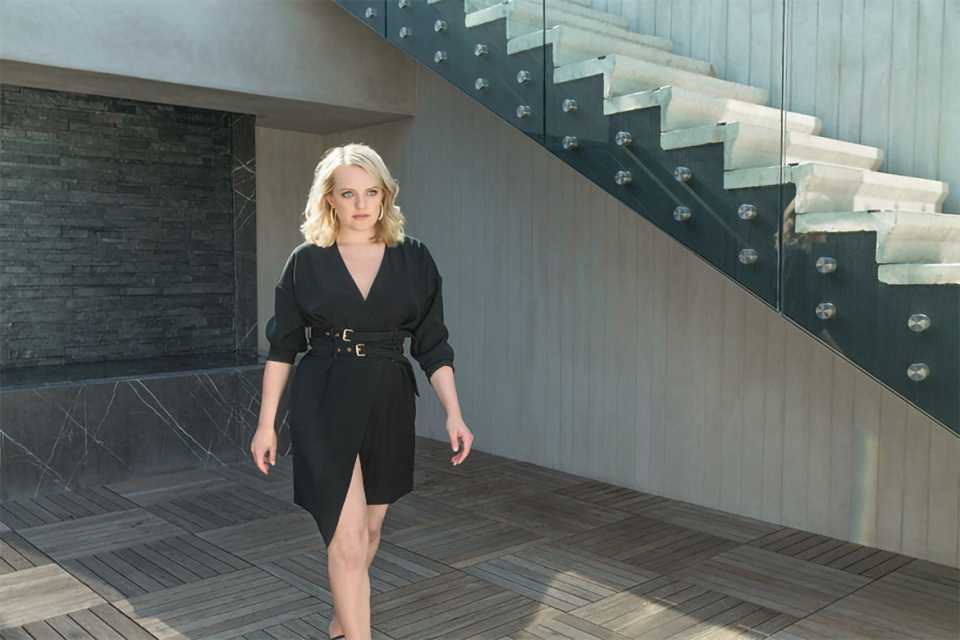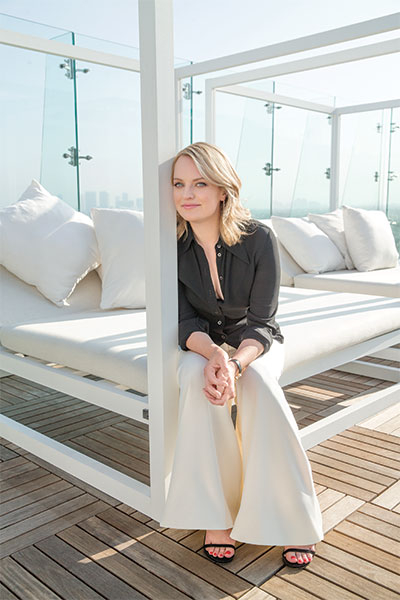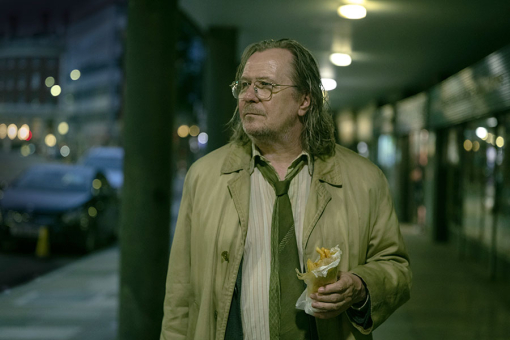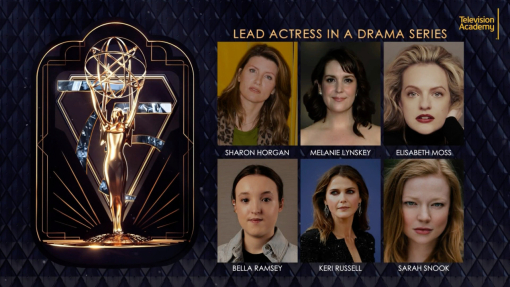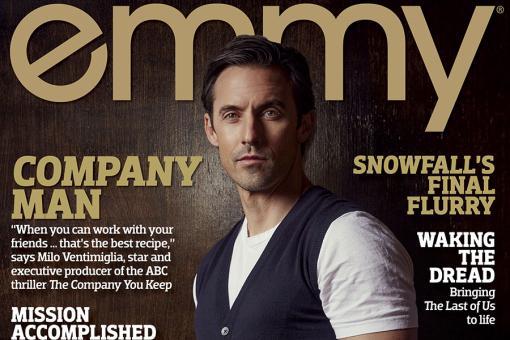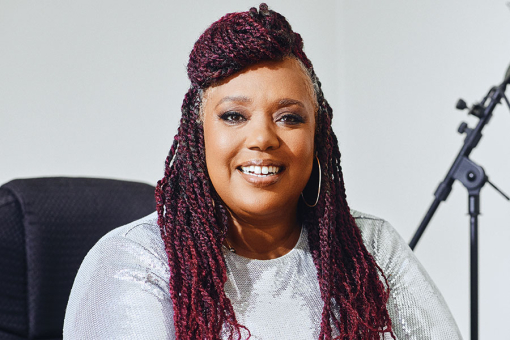Years before she played Offred in Hulu’s The Handmaid’s Tale or scrappy Sydney-based detective Robin Griffin in SundanceTV’s Top of the Lake or striving copywriter Peggy Olson in AMC’s Mad Men, Elisabeth Moss made her TV debut as young Lucky Santangelo in the 1990 NBC miniseries Lucky Chances.
At the time she was seven years old, and though most of her acting duties involved typical kiddie- role dialogue — squealing “Daddy!” when her father entered her birthday party, playing with her younger sister — she did have a pivotal scene. In it, she runs down to the swimming pool and finds her mother, played by Sandra Bullock, facedown on an inflatable raft, bloody and lifeless.
Then she delivers a sustained shriek that is chilling because, even back then, Moss knew how to own a moment, and also because it was augmented by ’90s-era echo-y audio effects.
“I started off dark from the very beginning,” says Moss, sitting in a booth in a deserted lounge at The London West Hollywood hotel. “From the very beginning, I was like, ‘Bring it on.’”
She’s joking but, over the past decade, Moss’s rising fame can be directly connected to her gift for portraying emotionally roiling characters, not to mention stamina to rival a long-haul trucker. (Since Mad Men ended two years ago, she’s appeared in at least eight movies, including The Square, which won the Palme d’Or at this year’s Cannes Film Festival.)
It’s no surprise, then, that her name immediately came up when the group behind the small-screen adaptation of Margaret Atwood’s eerily resonant 1985 dystopian novel The Handmaid’s Tale first started discussing who should be the star.
“At the beginning we were saying, ‘Wouldn’t it be great if we could get someone like Elisabeth Moss?’” says the series showrunner, Bruce Miller, about the leading role of Offred, a Handmaid in the Republic of Gilead, a totalitarian state run by religious fundamentalists. “Then eventually someone said, ‘Hey, why don’t we just get in touch with her?’”
Once they located Moss — she was in Australia shooting Top of the Lake: China Girl, the series’ second season — it took a month of emails and time-zone-challenged phone conversations with Miller and executive producer Warren Littlefield to convince her to sign on.
Why the wait? Was she considering some of the unusual contours of the role? Was she apprehensive about taking on, essentially, two characters? One is the enslaved Offred, a rare woman able to bear children, who is assigned to a commander (Joseph Fiennes) and forced to submit to ritual rape. The other is June, seen in flashback as a happy-go-lucky pre-Handmaid wife and mother.
Or was she worried that, because Offred is often silent, she would be expected to match her performance to pages and pages of expository voiceover?
“I was more concerned about doing another series after Mad Men. It comes down to a time commitment,” Moss says, possibly considering the dozens of indie films, TV shows and theater roles she’d miss out on. “You don’t want to get stuck in something where you’re like, ‘How did I get here?’ Which is why I took so long to think about it.”
With her starring role, she received the title of producer, something Moss had no intention of regarding as a vanity credit. “She went from flirtation with the project to being completely committed,” says Littlefield, who began emailing her links of work by potential directors for the 10-episode series.
“I’d send four or five different things to look at, and then, a couple of days later, I’d get these in-depth notes and analyses of everything,” Littlefield says. “And I went, ‘Oh, shit. Lizzie!’” (Everyone, even Moss’s most glancing acquaintances, calls her Lizzie.)
“‘I know that there’s a weekend in there, but you’re starring in Top of the Lake, you’re in Australia, and I’m looking at everything you did — a complete write-up, feedback, your thoughts and feelings. So you must not sleep.’ And she said, ‘Well, I sleep a little. Probably not enough. But this is really important to me.’”
When it was suggested that indie cinematographer–turned-director Reed Morano be considered to direct the pilot and two additional episodes, Moss was the one who had the firsthand experience. “I’d done a cameo in her film Meadowland,” Moss says. “We were friends, and I knew that personally I really liked her.”
By the time production began in Toronto in September of last year, Moss had assigned herself a job title. “I considered myself the Head of the Acting Department, like, ‘These are my guys, and I have to take care of them.’” By this she meant that, along with being in almost every scene, she found time to serve as a conduit between the cast and the directors, producers and cinematographer.
One detail Moss never considered, however, was just how difficult it would sometimes be for others to track her down. Take, for example, those big crowd scenes in the show, in which she and dozens of other actresses — dressed identically in voluminous red robes and winged white wimples — stand deferentially with heads bowed.
“When a director came on set and tried to find you? And there are 10 or 50 of you? You could see them wandering around, going, ‘Lizzie? Lizzie?’ Like my dresser, Rudy, he’s amazing. He’d have to walk around looking under people’s bonnets until he found me, and I’d be shouting, ‘Over here! Over here!’” Wardrobe inconveniences aside, Bruce Miller feels he’d found “the perfect match in a million different ways.
“It’s not just the way she looks in her performance,” he explains, “her versatility and range, her ability to act with her face, playing a character who hides her emotions from other people but also lets every thought that goes through her head flit across her face. She has so much television experience. She knew it was going to be emotionally taxing and just exhausting. It doesn’t matter if you get the right person if they don’t know that.”
Moss’s preparations weren’t entirely interior, either. She somehow managed to wedge in several drinks-and-dinner bonding sessions with Samira Wiley, who plays June’s closest friend, Moira.
“Before I met her, I thought, ‘I’m not going to have anything in common with this woman or know how to talk to her; I’m going to have to figure out how to ‘act’ this friendship,’” Wiley says. “But it ended up being so easy. She was so open and honest.”
What surprised the classically trained Wiley most, though, was revealed in a conversation she had with Moss and O.T. Fagbenle, who plays June’s husband, Luke.
“We were talking about how he went to RADA [the Royal Academy of Dramatic Art] in London, and I was trained at Juilliard, and [Lizzie] made this joke,” Wiley says. “She said, ‘Do you know where I went? I went to work.’ She’s somebody that I think I have a lot to learn from. So I was very, very surprised that Lizzie has no training.”
On set, Moss listens to music to establish the right mood, and by the time she removes her earbuds, she’s ready to plumb the depths of searing internal turmoil for the camera. But the minute she hears “Cut,” she’s likely to start cracking jokes.
“I can’t imagine having to live in these characters and take them home,” Moss says. “For me, acting is fun. It’s pretend. I think it’s important to be able to access different emotions and not necessarily be stuck in one of them.”
“I don’t know how she does it,” says Top of the Lake co-creator Jane Campion. “I don’t know if she knows how she does it. I describe it as ‘Lizzie’s underground rivers.’ She knows how to get into the flow of something you can’t even see is there until she’s found it. Lizzie’s quality is that she can take you inside — she makes you think and wonder about her. And I think it makes her really empathetic and very moving.”
The way Campion asked Moss to return for a second mystery-filled season of Top of the Lake was by scrawling on a napkin "TOTL2? Let’s talk,” and slipping it under Moss’s hotel-room door.
At lunch the next day, Campion says, Moss told her she’d be on board but wanted her detective character — who, among other things in season one, is haunted by memories of being gang-raped at age 15, drinks to excess and has to break up a ring of men who drug young girls and molest them — to face more obstacles.
“She said she wanted [Robin] to be challenged more extremely than in the first story,” Campion says, laughing hard at the memory. “I do remember when [co-creator Gerard Lee and I] were writing it, saying to each other, ‘Is this challenging enough? What should we do? Should we have her arm amputated?’”
Elisabeth Singleton Moss, the elder child of musicians Ron and Linda Moss, grew up in woodsy Laurel Canyon in Los Angeles. By age five, she’d set her sights on becoming a professional dancer, studying at one point with ballerina Suzanne Farrell at the John F. Kennedy Center for the Performing Arts in Washington, D.C.
Her acting career began in 1988, when she was discovered during her appearance as a wide-eyed, tiny Gretl von Trapp in a ballet-class production of The Sound of Music.
“An agent who was there approached my mom and asked, ‘Does she want to go on auditions?’” Moss says. Not much later, she was baying mournfully at Sandra Bullock’s bobbing corpse in Lucky Chances and essentially never stopped working.
“When I was little,” she recalls, “I had a really big imagination. Most actors say that. But mine was, like, very story-oriented. There were problems, complications. So the only difference was that suddenly someone was paying me for it. I know this sounds weird, but it’s hard for me to remember a time when I didn’t love doing this.”
Moss’s early filmography teems with not-particularly-memorable appearances in sitcoms, TV movies and feature films. During channel-flipping sessions, you might be surprised to catch her, for example, in Jocelyn Moorhouse’s 1997 film A Thousand Acres, in which Moss and Michelle Pfeiffer show up as sisters.
In Girl, Interrupted, Winona Ryder and Angelina Jolie were the box-office draw, but Moss, almost unrecognizable in burn-victim prosthetics, appeared as Torch, a mental patient who set herself on fire.
One of Moss’s theories about how she managed to stay off the red-carpet-and-party circuit involves her decidedly un-show-biz world. “My family were musicians, and all my friends were ballet dancers,” she says. “I wasn’t friends with any actors.”
Nonetheless, she landed roles so steadily that her education is a child-actor-style patchwork of home-schooling, on-set tutoring and getting her GED at 15. Moss’s mom, a professional jazz and blues harmonica player, accompanied her to every set until she was 17, when she nabbed a recurring role as President Jed Bartlet’s youngest daughter, Zoey, in Aaron Sorkin’s White House drama The West Wing.
Her seemingly effortless leap from playing someone’s little girl into more grownup parts — Zoey would be in her 20s by the end of The West Wing’s run — came about because she wasn’t exactly a household name. “I was with all of these adults on a serious show,” she says. “I was never on a show that younger people watched. I wasn’t famous.”
Then, in July 2007, the first episode of Mad Men aired. As ad agency newbie Peggy Olson — wearing a tight, mustard-colored sweater with short, uneven bangs and a wide-eyed, watchful expression — Moss made her entrance trailing after Christina Hendricks’s imperious head secretary, Joan. Seven Emmy nominations later, her anonymous days were over.
The noisy customers starting to trickle into the lounge for end-of-the-day drinks barely glance at Moss, who, despite now calling Manhattan home, is a very playful California girl today: she’s wearing a short blue skirt and a sheer white T-shirt covering a lacy Day-Glo orange bralette.
Not long after she’s seated, she whips out a foil packet of effervescent vitamin powder. Before she pours it into a glass of ice water, she quips, “I’m going to snort this off my hand.”
In the wake of her Handmaid’s triumph (“Moss’s performance is perfect: at once contained and open, withdrawn and bristlingly aware,” read a typical review), her producing skills and marketing savvy have also been on display.
“Some people may have a hesitation about going to a place that hasn’t had their tentpole show yet,” was Moss’s reasoning when it came to embracing Hulu, even though the streaming service was still searching for a breakthrough hit before this series. “But I actually love it because you get more marketing attention, a bigger budget.
"That’s what it was like for Mad Men and for Top of the Lake. You get more focus because you’re the one they’re going to put everything behind.”
Still, there have been teachable moments. Last April during a post-premiere panel at the Tribeca Film Festival, she learned that, once the spotlight is on you, it’s important to choose your words carefully. When asked if Handmaid’s was a feminist tale, Moss replied it was a “human story.”
The internet lit up with accusations that she was trying to downplay the obvious connections among the series, the women’s movement and the current political climate.
“Stung is a great word,” Moss says. She calls herself a longtime feminist, and was with the thousands who showed up at the Women’s Day March in Toronto (where Handmaid’s Tale is shot) to protest President Donald Trump. “But I’ve listened to what I said, and I obviously didn’t communicate my thoughts correctly. Which I can take full ownership of.
"But also, I’m not a politician. I haven’t been trained. I haven’t practiced. I only have my personal feelings. That said, I obviously should have said, ‘This is a feminist story, first and foremost, but it is also et cetera, et cetera.’”
For the past half hour, Moss’s phone has not stopped buzzing. “Why are you calling me?” she says to her mobile after glancing at the screen and seeing her agent’s number. In September, production will begin on the second season of Handmaid’s Tale, on which she will be upgraded to executive producer.
Also occupying her thoughts is a limited series for BBC America — which she’ll also star in and executive-produce — about Typhoid Mary, the woman known as the Patient Zero of typhoid fever. “It’s called… FEVER,” Moss hisses mock-menacingly, then laughs. “Another comedy! I figured I hadn’t played an asymptomatic carrier who’s a murderer yet. So I was like, ‘Let’s do that! Let’s really alienate audiences.’”
Though she’s slated to take some time off soon, she’s not sure she can keep her workaholic tendencies at bay. “It usually doesn’t go too well for me,” she admits with a knowing shrug. “I like to work, and time off always disappears. When I’m a little older, I can slow down.”
For a behind-the-scenes peek at our cover shoot, click HERE
This article originally appeared in emmy magazine, Issue No. 7, 2017

